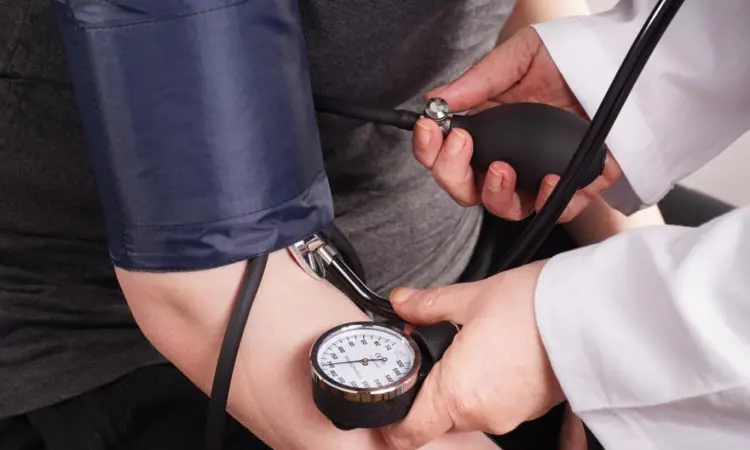- Home
- Medical news & Guidelines
- Anesthesiology
- Cardiology and CTVS
- Critical Care
- Dentistry
- Dermatology
- Diabetes and Endocrinology
- ENT
- Gastroenterology
- Medicine
- Nephrology
- Neurology
- Obstretics-Gynaecology
- Oncology
- Ophthalmology
- Orthopaedics
- Pediatrics-Neonatology
- Psychiatry
- Pulmonology
- Radiology
- Surgery
- Urology
- Laboratory Medicine
- Diet
- Nursing
- Paramedical
- Physiotherapy
- Health news
- Fact Check
- Bone Health Fact Check
- Brain Health Fact Check
- Cancer Related Fact Check
- Child Care Fact Check
- Dental and oral health fact check
- Diabetes and metabolic health fact check
- Diet and Nutrition Fact Check
- Eye and ENT Care Fact Check
- Fitness fact check
- Gut health fact check
- Heart health fact check
- Kidney health fact check
- Medical education fact check
- Men's health fact check
- Respiratory fact check
- Skin and hair care fact check
- Vaccine and Immunization fact check
- Women's health fact check
- AYUSH
- State News
- Andaman and Nicobar Islands
- Andhra Pradesh
- Arunachal Pradesh
- Assam
- Bihar
- Chandigarh
- Chattisgarh
- Dadra and Nagar Haveli
- Daman and Diu
- Delhi
- Goa
- Gujarat
- Haryana
- Himachal Pradesh
- Jammu & Kashmir
- Jharkhand
- Karnataka
- Kerala
- Ladakh
- Lakshadweep
- Madhya Pradesh
- Maharashtra
- Manipur
- Meghalaya
- Mizoram
- Nagaland
- Odisha
- Puducherry
- Punjab
- Rajasthan
- Sikkim
- Tamil Nadu
- Telangana
- Tripura
- Uttar Pradesh
- Uttrakhand
- West Bengal
- Medical Education
- Industry
Orthostatic hypotension should not deter intensive BP treatment among patients with hypertension

USA: There have been ongoing concerns about the benefit of intensive versus standard blood pressure treatment among patients with orthostatic hypotension or standing hypotension.
Considering this, a recent study published in the Journal of the American Medical Association (JAMA) sought to determine if the effect of intensive BP treatment on all-cause mortality or cardiovascular disease (CVD) differs based on the presence or absence of standing hypotension.
Stephen P. Juraschek, Harvard Medical School, Boston, Massachusetts, and colleagues found that asymptomatic orthostatic hypotension or standing hypotension among hypertension patients should not be a deterrent to more intensive hypertension treatment.
"The individual data meta-analysis involving more than 29,000 participants in 9 hypertension trials showed that more intensive BP treatment lowered the risk of all-cause mortality or CVD irrespective of whether participants had orthostatic hypotension," the researchers reported. "The effects did not differ by the absence or presence of standing hypotension."
For the research, the investigators conducted an individual participant data meta-analysis based on a systematic review of online databases through May 13, 2022. Randomized trials of blood pressure pharmacologic treatment (more intensive BP goal or active agent) with orthostatic hypotension assessments were selected.
They extracted individual participant data meta-analysis following PRISMA guidelines. Effects were determined using Cox proportional hazard models using a single-stage approach.
The main outcomes of the study were all-cause mortality or CVD. Orthostatic hypotension was defined as a reduction in systolic BP of at least 20 mm Hg and/or diastolic BP of at least 10 mm Hg after changing position from sitting to standing. Standing hypotension was defined as a standing systolic BP of 110 mm Hg or less or a standing diastolic BP of 60 mm Hg or less.
The researchers reported the following findings:
- The 9 trials included 29 235 participants followed up for a median of 4 years (mean age, 69.0 years; 48% women). There were 9% with orthostatic hypotension and 5% with standing hypotension at baseline.
- More intensive BP treatment or active therapy reduced the risk of CVD or all-cause mortality among those without baseline orthostatic hypotension (hazard ratio [HR], 0.81) similar to those with baseline orthostatic hypotension (HR, 0.83).
- More intensive BP treatment or active therapy lowered the risk of CVD or all-cause mortality among those without baseline standing hypotension (HR, 0.80), and nonsignificantly among those with baseline standing hypotension (HR, 0.94). Effects did not differ by baseline standing hypotension.
"In this population of hypertension trial participants, intensive therapy lowered the risk of CVD or all-cause mortality irrespective of orthostatic hypotension without evidence for different effects among those with standing hypotension," the researchers concluded.
The findings should "reassure clinicians that patients with orthostatic hypotension will derive the full expected benefits from antihypertensive therapy," add the authors of an accompanying editorial. "This also applies to patients treated to lower blood pressure goals, albeit with less certainty."
Reference:
Juraschek SP, Hu J, Cluett JL, et al. Orthostatic Hypotension, Hypertension Treatment, and Cardiovascular Disease: An Individual Participant Meta-Analysis. JAMA. 2023;330(15):1459–1471. doi:10.1001/jama.2023.18497
Dr Kamal Kant Kohli-MBBS, DTCD- a chest specialist with more than 30 years of practice and a flair for writing clinical articles, Dr Kamal Kant Kohli joined Medical Dialogues as a Chief Editor of Medical News. Besides writing articles, as an editor, he proofreads and verifies all the medical content published on Medical Dialogues including those coming from journals, studies,medical conferences,guidelines etc. Email: drkohli@medicaldialogues.in. Contact no. 011-43720751


